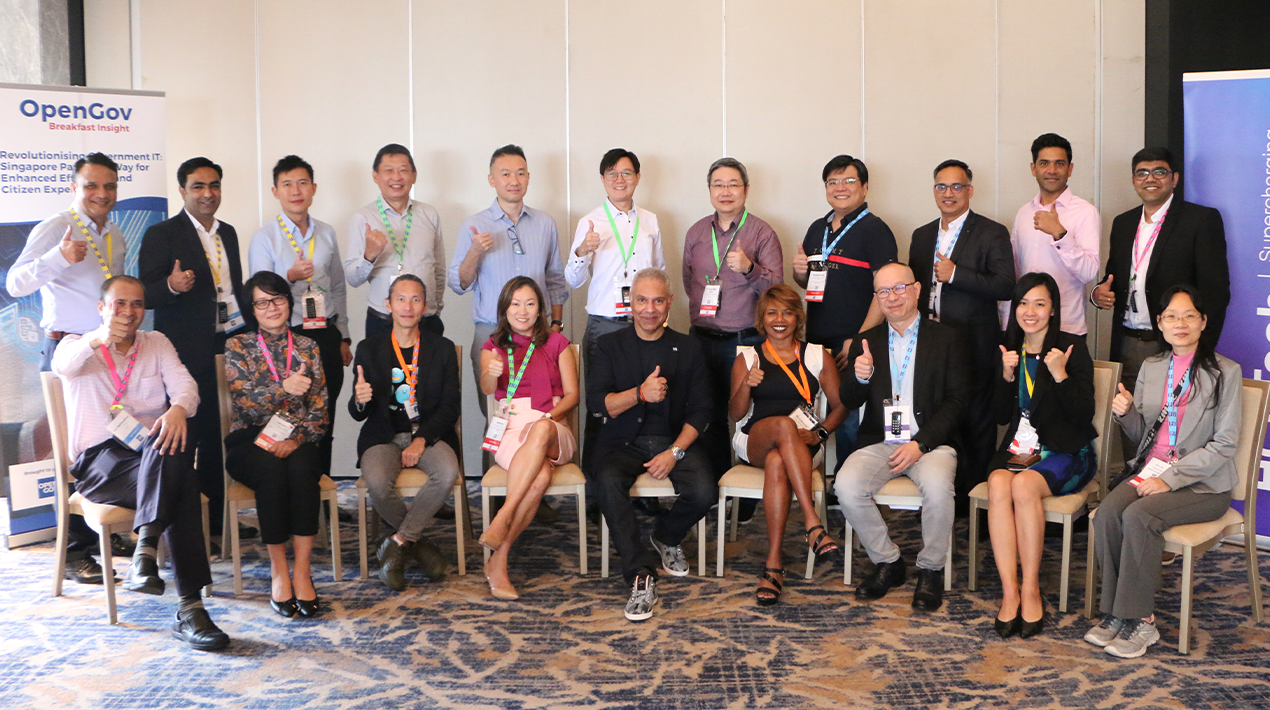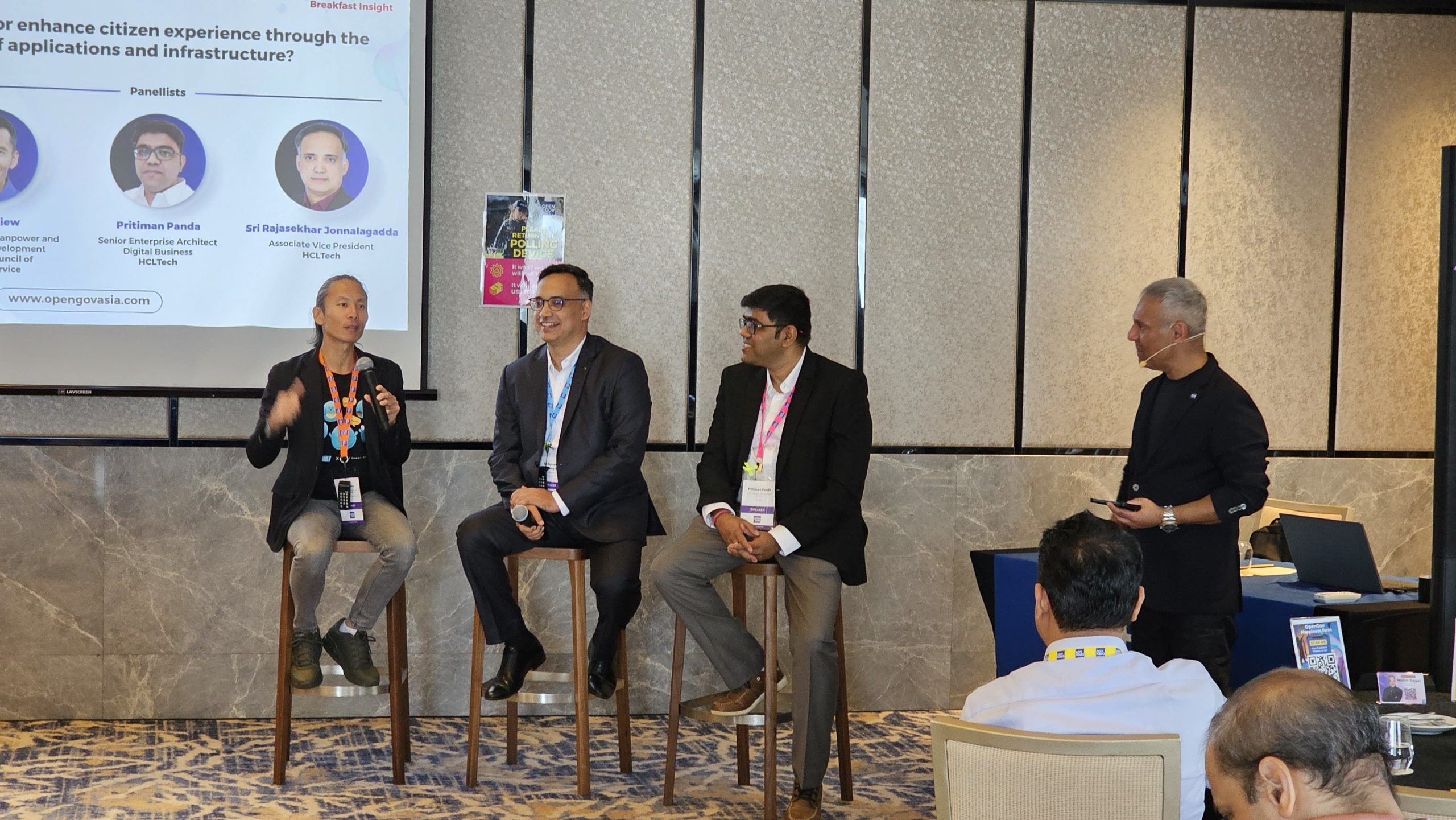
|
Getting your Trinity Audio player ready...
|
Singapore distinguishes itself globally as a symbol of digital transformation, driven by unwavering dedication, forward-thinking leadership, and robust support.
At the heart of this advancement lies the Smart Nation Programme, a pioneering initiative leveraging cutting-edge technology and data analysis to propel Singapore into a realm of connectivity and innovation. It stands as a testament to Singapore’s commitment to enhancing all facets of society through progressive initiatives.
This success is not a stroke of luck but the culmination of sustained efforts to gradually migrate dependencies onto cloud infrastructure. Currently, an impressive 60% of eligible government systems operate seamlessly within the Government Commercial Cloud (GCC), marking a pivotal milestone in the nation’s digital evolution. Furthermore, the success is underscored by a nearly 50% reduction in hosting costs, demonstrating the effectiveness of the strategic transition to cloud technology.
Going beyond traditional digital transformation, the Singaporean government is actively pursuing two crucial adjustments in its IT practices: the widespread adoption of Software as a Service (SaaS) and the convergence of infrastructure and application maintenance. The practical application of SaaS is evident through the implementation of a low-code platform, optimising over 100 on-premise applications across various government organisations.
The integration and streamlining of infrastructure and applications in a hybrid cloud environment bring forth a value proposition rooted in experience-oriented and business-aligned results. This is achieved through the automation of application support operations, underpinned by intelligence and contextuality.
The key components encompass an operational model tuned to the business context, a DevSecOps-based team structure fostering a robust engineering culture, and platforms steering observability and automation roadmaps. Integral to this mix are AIOPS/SRE operations, providing predictive prevention capabilities.
For the effective execution of digital transformation endeavours, future-ready projects must align with platforms that streamline processes, curtail costs, and unleash the full potential of their workforce, enabling them to deliver value at an accelerated pace.
The prominence of low-code platforms, particularly in business process management (BPM), case management, and decision management, is noteworthy. These platforms are not merely confined to conventional functionalities but extend their capabilities to encompass artificial intelligence (AI) and robotic process automation (RPA).
As Singapore continues to chart its course in the digital landscape, these initiatives underscore a commitment not only to technological advancement but, more importantly, to the holistic betterment of society.
The OpenGov Asia Breakfast Insight on 25 January 2024, at Voco Orchard Singapore, delved into the realms of application infrastructure and low-code platforms in public services, emphasising their transformative potential to elevate the citizen experience. Representatives from various Singaporean public sector organisations were in attendance, emphasising the collaborative spirit driving Singapore’s path towards digital excellence.
Opening Remarks

Mohit Sagar, CEO and Editor-in-Chief of OpenGov Asia notes that there is an increasing expectation for government services to be delivered swiftly. Consequently, the need for infrastructure that facilitates the acceleration of digital transformation in government services becomes imperative to meet these expectations.
In the current scenario, the public sector must prioritise cost savings, particularly in operational efficiency. Achieving this goal involves streamlining infrastructure and applications, effectively reducing operational costs associated with items such as software licensing, hardware maintenance, and support services.
In a sustainability-conscious world, energy efficiency is vital, Mohit says, pointing out that having fewer hardware components and servers not only reduces operational costs but also contributes to environmental sustainability by minimising energy consumption.
In the digital era, prioritising good, sustainable application operations is a powerful strategy to meet people’s expectations, as well as essential technology needs. Governments can improve the quality of digital interactions and build long-term, productive relationships between citizens and public services by emphasising automation, scalability, security and user-centred design.
Singapore has established itself as a global leader in leveraging digital technology to transform public services, streamline operations and generate significant cost savings. The Singapore government’s commitment to innovation and efficiency has made it a model for other countries looking to harness the benefits of digital transformation.
In this fast-paced digital era, public institutions that want to remain competitive and provide an exceptional user experience must adapt to the way they operate their applications. The operational transformation of digital applications is a strategic priority to be able to provide successful and citizen-centred public services.
Governments can succeed in this change, meeting the growing needs of citizens in the digital era, if they:
- Adopt cutting-edge technologies such as automation, cloud services, and artificial intelligence (AI) to increase efficiency, scalability, and security
- Promote collaboration between various departments and agencies to develop and maintain applications effectively
- Guarantee security and compliance by implementing strict security standards and ensuring the application meets all applicable regulations
- Maintain a commitment to continuous improvement by continuously evaluating application performance, gathering user feedback, and regularly updating features and functionality
One of the key drivers in improving the citizen experience is public sector initiatives to consolidate infrastructure and applications. The government has taken conscious steps to integrate applications and infrastructure after realising the inefficiencies caused by disjointed systems. Through this combination, services for citizens will be significantly improved while streamlining internal operations and creating a seamless digital environment.
The benefits of consolidation are not only limited to improving operational efficiency, but also provide direct benefits to citizens by providing better services, faster response times, and a more seamless public sector experience. Simply put, the consolidation journey is a dedication to improving service quality and efficiency to ultimately produce a more satisfying and user-centric citizen experience, not just a technology change.
Mohit believes that taking digital transformation seriously in the government environment would have a very positive impact on government services to the community itself. “Efficiency is the most important thing, and we continue to believe that the Singapore government can meet the expectations of its citizens in terms of public services.”
Welcome Address

Aloysius Lim, Client Partner at HCLTech extended a warm welcome to all guests, speakers and active participants gathered for the session. In his opening comments, he set a positive and inclusive tone for the occasion, fostering an atmosphere of participation and engagement among the diverse audience.
During the event, participants would have the opportunity to delve into the multifaceted dimensions of Government IT, spanning from the adoption of cutting-edge solutions to the integration of data-driven strategies. This approach underscores the comprehensive nature of the evolution necessary to propel government IT into a new era of effectiveness and citizen-centric service delivery.
Revolutionising Government IT goes beyond mere technology adoption; it necessitates fostering a holistic shift in mindset and practices. Key focal points in this transformative journey include enhancing efficiency and optimising citizen experiences.
Aloysius recognises that at the heart of Singapore’s success lies the Smart Nation Programme, a pioneering initiative leveraging cutting-edge technology and data analysis. The nation stands as a noteworthy example, showcasing achievements in hosting cost reduction and the widespread adoption of Software as a Service (SaaS).
Singapore’s commitment to providing seamless, user-friendly services through the convergence of SaaS and infrastructure and application maintenance is a testament to its dedication to citizen-centric approaches. The use of low-code platforms and the incorporation of AI and RPA capabilities reflect Singapore’s transformative efforts in redefining citizen interactions with government services.
These accomplishments underscore the importance of comprehensive initiatives that encompass not only technological advancements but also a cultural and operational evolution within the government sector.
Aloysius expressed his hopes for meaningful conversations, insightful discussions, and transformative learning and encouraged the participants to draw inspiration from the successes and challenges faced by stakeholders in the field.
“Singapore’s journey in revolutionising Government IT serves as a beacon for nations around the world, showcasing the tangible benefits that arise when technology aligns seamlessly with the needs and aspirations of its citizens,” Aloysius believes. “The innovations we explore today have the potential to shape the future of governance, making it more responsive, inclusive, and efficient.”
He envisions a future where governments leverage emerging technologies not only for administrative efficiency but also to address complex societal challenges. Whether it’s in the realms of healthcare, education, or environmental sustainability, Aloysius believes that the convergence of technology and governance can pave the way for innovative solutions that enhance the overall well-being of citizens.
Power Talk
Intending to improve citizen experience and optimise operational responsiveness, the Singaporean government has embarked on a substantial initiative to consolidate applications within its public sector, addressing the challenges posed by diverse systems through a comprehensive programme simplification and coordination effort.
The primary objective of this strategic move is to make the digital landscape more adaptable and interconnected. By centralising applications, the government aims to mitigate duplication issues, foster enhanced integration of data, and promote a collaborative environment across different government agencies. This approach is expected to significantly improve efficiency and responsiveness within Singapore’s public sector, ultimately benefiting citizens and optimising government operations.

Bruce Liew, Director of Sector Manpower and Leadership Development at the National Council of Social Service, underscores challenges in leveraging digital technology for enhanced citizen services in Singapore, pointing out the significant issue of diverse systems across government agencies that may result in potential interoperability challenges.
“To tackle this issue, the Singaporean government has embarked on a strategic initiative for application consolidation, aiming to minimise redundancy and improve data integration,” reveals Bruce.
This effort is crucial for creating a cohesive and interoperable digital landscape, facilitating seamless collaboration among government agencies. Bruce emphasises the importance of fostering a collaborative atmosphere across agencies. The goal is to create a shared understanding of the benefits of digital transformation and encourage a cooperative approach to utilising technology for citizen services.
In addition, the National Council of Social Service is actively involved in supporting the development of digital skills within the sector. This includes providing training programmes, resources, and guidance to empower social service professionals in effectively utilising digital tools.
Bruce explains that the collective endeavours are geared towards surmounting challenges and facilitating the implementation of efficient and citizen-centric services in Singapore, underscoring strategies for democratising the adoption of state-of-the-art technologies in the public sector.
In addition, he acknowledges the significance of putting in place thorough education and training programmes to provide government workers with the know-how to use technology effectively. He also stresses the necessity for new technologies to prioritise inclusivity and accessibility to meet the wide range of needs of the populace.
Bruce advocates for collaboration and knowledge sharing among government agencies as a crucial strategy to enhance the citizen experience and promote a unified adoption of cutting-edge technologies for increased efficiency.
By encouraging public-private partnerships, implementing pilot programmes, maintaining transparent communication and prioritising user-centric design, the public sector seeks to make these technological advancements accessible, inclusive and beneficial for all citizens in Singapore, ultimately contributing to an improved and smooth adoption process.

According to Pritiman Panda, Senior Enterprise Architect Digital Business, HCLTech, the alignment of the overall digital business strategy with the consolidation of infrastructure and applications is pivotal for achieving organisational objectives. The consolidation of infrastructure and applications streamlines the technological landscape, fostering a more cohesive and integrated environment.
“This harmonisation is fundamental for supporting the broader digital business strategy,” Pritiman asserts. “It ensures that technological resources are efficiently utilised, and redundancies are minimised.”
This method enhances agility and responsiveness, enabling the organisation to adapt swiftly to changing market demands. It allows for a more centralised and standardised approach to digital initiatives, facilitating seamless collaboration and data integration across various business functions.
Ultimately, the synergy between the digital business strategy and infrastructure consolidation positions the organisation to leverage cutting-edge technologies, optimise operational efficiency, and deliver a more cohesive and advanced digital experience to clients and stakeholders.
In the realm of digital transformation and innovation, the consolidation of infrastructure and applications serves as a crucial foundation for streamlined operations and increased agility, providing support by rationalising and unifying disparate systems to simplify the technological landscape.
This, in turn, enables a more efficient deployment of cutting-edge technologies and accelerates the adoption of innovative solutions across the organisation. By reducing complexities and redundancies, consolidation allows businesses to redirect resources towards strategic digital initiatives, fostering a more dynamic and innovation-driven environment.
HCLTech, as a leading technology solutions provider, can significantly contribute to these efforts. Leveraging its expertise in enterprise architecture and digital solutions, it assists organisations in planning and executing effective consolidation strategies.
“Our comprehensive suite of services includes assessment of existing infrastructure, designing and implementing streamlined architectures, and ensuring a seamless transition towards a consolidated and future-ready IT landscape,” Pritiman elaborates.
Moreover, HCLTech is well-positioned to offer ongoing support and collaboration in implementing innovative digital solutions, helping organisations stay at the forefront of the rapidly evolving digital landscape. Through tailored strategies and technological expertise, HCLTech aims to empower businesses to navigate their digital transformation journey with confidence and innovation.

Sri Rajasekhar Jonnalagadda, Associate Vice President, HCLTech believes that in the integration of innovative projects with digital transformation, the selection of a platform becomes a critical factor in optimising processes and maximising the capabilities of the workforce.
“To achieve success in this endeavour, organisations should prioritise platforms that offer flexibility, scalability, and seamless integration with existing systems,” Sri Rajasekhar says.
A robust digital transformation platform should be agile enough to adapt to evolving business needs while providing the necessary tools to streamline processes and enhance operational efficiency. By selecting a platform with open architecture and interoperability, organisations can ensure that their innovative projects seamlessly integrate with existing systems, avoiding silos and promoting a cohesive digital ecosystem.
Besides, the workforce is a central component in the success of digital transformation initiatives. A platform that maximises employee capabilities should prioritise user-friendly interfaces, intuitive workflows, and comprehensive training programmes.
Organisations should empower employees with the tools and resources needed to leverage innovative technologies effectively. Additionally, features such as automation, artificial intelligence (AI), and analytics embedded within the platform can augment the capabilities of personnel, enabling them to focus on higher-value tasks and fostering a culture of continuous improvement.
“We understand the importance of selecting the right digital transformation platform,” Sri Rajasekhar declares. “Our expertise lies in assisting organisations in making informed choices that align with their business objectives, ensuring the successful integration of innovative projects.”
In the contemporary landscape, the public sector is under a critical imperative to prioritise cost savings and sustainability, aiming to bolster operational efficiency, streamline applications, and promote fiscal responsibility. This approach allows government agencies to allocate resources effectively while aligning with global initiatives addressing climate change and advocating responsible governance.
Sri Rajasekhar highlights HCLTech’s readiness to support the public sector in achieving cost savings and sustainability goals through services such as infrastructure optimisation, application consolidation, and strategic IT planning. The commitment extends to facilitating environmentally responsible practices, aligning with HCLTech’s reputation for expertise in digital transformation and efficient IT solutions.
Closing Remarks
In closing, Aloysius Lim, Client Partner at HCLTech, extended his gratitude for the perceptive discussions and applauded Singapore’s remarkable journey in government IT. He commended the nation’s unwavering commitment to innovation, establishing itself as a global leader in leveraging technology for enhanced efficiency and elevated citizen experiences.
 “As we navigate the ever-evolving landscape of technology, it is evident that Singapore is at the forefront of innovation, spearheading initiatives to enhance efficiency and elevate citizen experiences,” Aloysius believes.
“As we navigate the ever-evolving landscape of technology, it is evident that Singapore is at the forefront of innovation, spearheading initiatives to enhance efficiency and elevate citizen experiences,” Aloysius believes.
Aloysius considers that the collaborative endeavours between HCLTech and various government agencies stand as a testament to shared values and a vision of creating a connected, efficient, and citizen-centric ecosystem.
The commitment of the government to harness the power of digital transformation is commendable, and it sets a precedent for nations globally. The emphasis on optimising processes and maximising workforce capabilities resonates with HCLTech’s core values, and Lim conveyed eagerness to contribute to Singapore’s continued success in the digital era.
Aloysius urged participants to carry forward the spirit of collaboration and innovation, emphasising the potential for a future where government IT surpasses citizen expectations.
Expressing his genuine gratitude, Mohit acknowledged the depth of insights and the spirit of collaboration that defined the entire session. He appreciated the shared efforts and the valuable contributions made by all participants, highlighting the cooperative nature of the discussions. This collective engagement and the commitment to shared goals fostered an environment where diverse perspectives converged to enrich the session with meaningful contributions.
Mohit agreed that Singapore’s journey in government IT stood out prominently during the session. He specifically underscored the nation’s unwavering dedication to innovation and digital transformation, emphasising that Singapore has set a benchmark on the global stage.
Singapore stands as a shining example, spearheading achievements in the adoption of cutting-edge technologies and cultivating a culture of continuous innovation that resonates not only nationally but also on the international stage.
Singapore’s success story, built on partnership and inclusiveness, serves as an example for nations exploring the potential of a digital future. The indispensability of digital collaboration for nations and organisations striving to remain competitive, agile, and innovative in the current dynamic business landscape, cannot be understated.
Significant collaborations, featuring esteemed organisations, are embodiments of a collective commitment to fostering positive change in the digital landscape. Sustaining the momentum created through continuous collaboration, innovation, and shared learning is of paramount importance. This approach not only contributes to the continued success of these initiatives but also reinforces a culture of positive transformation in the digital domain.
















